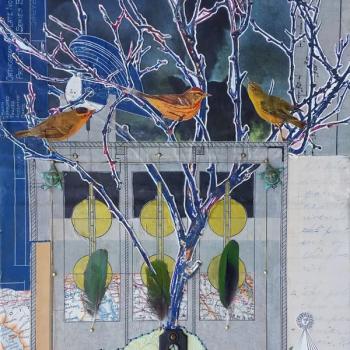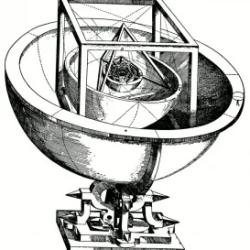 In the age of Darwin, what do we still have to learn from philosophers like Socrates or the Buddha?
In the age of Darwin, what do we still have to learn from philosophers like Socrates or the Buddha?
Ancient philosophers differed from those today in one crucial way:
For them, philosophy was a way of life.
Can science, too, be a way of life?
Philosophy as a way of life
All the ancient philosophers, from Socrates to the Buddha, investigated their world not just for the sake of learning, but in order to discover how to live a flourishing life.
For example, when Socrates asked his fellow Athenians about piety or virtue, it wasn’t just for love of conversation – he wanted to expose the confusion fouling up the unexamined life. When Hypatia of Alexandria explored mathematics and astronomy, it wasn’t just for the sake of learning – she wanted to know how she fit into the cosmos. And when Siddartha Gautama investigated the nature of desire and aversion, it was not out of pure interest in psychology – he wanted to know how to eradicate suffering. All their explorations led eventually back to one key question: How should we live?
Today, we know much more about nature than the ancient philosophers ever did.* Yet, we seem to know far less about how to live. Can ancient philosophy teach us how to find science spiritually-relevant again?
The role of science in ancient spirituality
In ancient times, there was no separation between science, philosophy, and spirituality. All belonged to one comprehensive field of study, and all were connected. Insights from the one flowed into the others.
For example, the Greek philosopher Epicurus proposed theories of meteorology and perception. He described how colliding winds could create thunder, and how imperceptibly small films flying off of objects might enter our eyes to create vision (this is not how vision works, of course, but it is remarkably accurate for the sense of smell). On the face of it, these theories sound like pure science. Their aim, however, was philosophical and spiritual (in the therapeutic sense). The theory of meteorology was meant to relieve anxieties that thunder might be the voice of some wrathful deity whose attention you’d caught. Likewise, the theory of perception aimed at explaining how we might perceive so-called “ghosts” of the deceased (the films linger in the mind and continue to affect perception, especially in dreams). We need not fear the dead, said Epicurus, for these “ghosts” are not present realities. In sum, the goal of Epicurus was freedom from anxiety. His science, like that of so many ancient philosophers, was intended to teach us something about how to achieve a flourishing life.
Can contemporary science rooted in evolution teach us anything like this? Can the discoveries of this Darwinian age alleviate anxiety and give us a way to live?
The role of science in spirituality today
If Epicurean theories of meteorology and perception can alleviate anxiety, thereby improving quality of life, why can’t modern science?
I suggest it can and does, usually without us ever realizing what a gift we’ve received. Here are three specific ways, just to name a few, that contemporary science teaches us how to live a flourishing life. Just as Epicurean philosophy yielded freedom from anxiety, science produces a few freedoms of its own.
Freedom from alienation
Take our relationship to plants and animals, for example. Pre-Darwinian philosophies in the West typically saw man as a privileged rational creature, alienated and distant from other forms of life. Yet, evolution reveals our kinship with the entire web of nature. We are all cousins on this planet. In this way, science frees us from the anxiety of isolation, and connects us to the rest of life on Earth.** Indeed, we can even feel kinship beyond the Earth and into the stars, for we now know that the heavy elements that compose us can only be fashioned inside supernovae. Some distant sun had to fling its innards out into the void, some of which had to eventually land here, else we would not exist at all. You might say the stars died so that we might live. Such visions spun by science remove anxiety and contribute a positive sense of awe and wonder.
Freedom from certainty
Another example of how contemporary science teaches us how to live concerns the burden of certainty. In the ancient world, it was often felt that we could either reason our way to unimpeachable truths, or know nothing at all. The Stoics, for example, thought they could prove their doctrines by reason, and Epicurus, for all his teachings have inspired us thus far, was no less dogmatic in this regard. In contrast, the Skeptics thought the diversity of ideas and customs among peoples showed that nothing at all could be known for certain, not even that nothing could be known. The gulf between knowledge and eternal ignorance was wide. Philosophers performed extreme mental contortions to defend their favored doctrines, meanwhile scorning rival beliefs out of the same desperate need for certainty.
Science, by contrast, offers a means of getting at highly probable bits of knowledge, while recognizing that we can never know anything for certain. Every fact is liable to be overturned by future evidence, a process otherwise known as progress. In this way, contemporary science removes the compulsion to defend notions as gospel truth***, while maintaining an optimistic outlook on knowledge. In short, it frees us from the tyranny of certainty.
It’s well-worth noting that this same freedom from certainty can help naturalists make sense of why others find religious and magical thinking appealing. Not only does it let us acknowledge that our own ideas cannot be perfect, but it also helps us understand how a plethora of different, mutually-contradictory ideas may flourish. From an evolutionary perspective, where reproductive fitness is what counts, there is no requirement that the fittest idea be the truest one. For those whose culture, economic situation, or genetic predispositions make religious or magical thinking the most fitness-enhancing, that is what will tend to be selected. For some, religious affiliation may be a mark of prestige in the community, for example, which might attract mates. As another possible example, magic may provide a more enchanting, connected world than the all-too-often dry pages of a science textbook, which might reduce stress such that overall fitness is improved (I prefer science, but that’s just me!). These prestige-increasing or stress-reducing effects could perhaps affect fitness. And whatever enhances fitness best for the individual is, from a Darwinian perspective, the way things will tend to go. If there are those of us who object on grounds of counterfactuality, it will do no good to wave a scolding finger at evolution. Instead, we can embrace those of all beliefs as fellow products of evolution, and stand in awe of the diversity generated by nature.
Freedom from perfection
A final example, perhaps the greatest but least-recognized gem science has to offer, is our relationship to ourselves. The ancient world commonly imagined a rational mind or spirit whose job was to reign over the appetites and passions, and which bore the sting of guilt when it inevitably failed to do so. Religions and philosophies alike produced generations of frustrated individuals chastising themselves for what they felt was their weakness of will. The impossible distance to perfection was experienced as a personal failing.
In contrast, the picture of volition painted by evolution accounts for imperfection. The appetites and passions evolved for specific purposes and continue to serve critical roles in human cognition.**** Furthermore, although we have evolved enough sophistication to inhibit emotional impulses when inappropriate, there is no need for evolution to have granted us perfect discipline in this regard, nor even any way to envision how it could. Evolution does not produce perfect things; it only produces things one step better than the last at reproductive fitness. In other words, it’s not our fault that we are imperfect. We can and should strive to improve ourselves, yet we don’t have to bear the mark of guilt for what we are. Science’s theory of the evolved mind frees us from the anxiety of perfection, so that we need not experience the distance to the ideal as a personal failure.
I say that this is perhaps the greatest gem science has to offer because it holds the key to the holy grail sought by virtually all ancient philosophers: freedom from suffering.
In order to recognize this why this is so, first we need to distinguish between pain and anxiety about pain. Pain is inevitable, a part of the human condition, and a certain amount of pain is often productive – the pain of struggling to give birth to something new, for example. But anxiety about pain – all the worrying and fretting – is completely avoidable. This relates to the anxiety of perfection, because aiming for flawlessness sets us up for failure and thus leads to anxiety over that failure – anxiety that is totally avoidable. The freedom from perfection frees us from anxiety about personal flaws by completely accepting the inevitability of personal flaws. When we completely and fully accept the fact that we will always experience some imperfection in ourselves, we cease to feel our natural blemishes as personal failings. Moreover, we become free to improve ourselves as much as humanly possible without setting ourselves up for failure.
For most people, even those diseased or starving, the vast majority of suffering in life is avoidable anxiety. Science can improve human welfare the instant we fully integrate this profound insight.
The three freedoms mentioned here – freedom from alienation, certainty, and perfection – are just a few of the many ways that science remains relevant to spirituality today.
The task of the new Darwinian philosopher
Contemporary science can teach us how to live. It frees us from many anxieties, often without us ever realizing the source of this miraculous fortune.
Yet all this is by no means guaranteed. We can miss out on the gifts of science. The human ability to compartmentalize knowledge means we may not apply the insights of science as broadly or systematically as we could. We could fail to reap its benefits by neglecting to observe its relevance. After all, science by itself is just a body of knowledge and methods; in order for it to change us, we must approach it with the right attitude.
Thus, individuals may choose to make their task the contemplation and exploration of all the implications of a Darwinian universe. A philosopher appropriate to this Darwinian age can work to apply scientific insights to every corner of life, especially one’s daily life.
We’ve already caught a glimpse of how that can be done. The freedoms above illustrate how we can apply science to our relationship to the world, other people, and ourselves. The freedom from alienation, for example, helps us discover how to relate to nature and the universe. The freedom from certainty helps us relate to other people, especially those with different beliefs. Finally, the freedom from perfection is a guide on our journey of self-discovery, learning how to relate fruitfully to ourselves. In ways such as these, the task of the philosopher can be accomplished.
Science as a way of life
Ancient philosophy was a way of life. Contemporary science, too, can be a way of life. Just as those in the ancient world roved over everything from physics to meteorology in search of how to live, so too can we draw insights from sciences ranging from cognitive psychology to astronomy.
In all our explorations, from the evolutionary tree to the Higgs boson, we can learn to hear the voices of Socrates, Hypatia, Buddha, Epicurus, and all the rest, softly whispering their one crucial teaching:
Discover how to live.
Subscribe to The Spiritual Naturalist Society
Learn about Membership in the Spiritual Naturalist Society
__________
The Spiritual Naturalist Society works to spread awareness of spiritual naturalism as a way of life, develop its thought and practice, and help bring together like-minded practitioners in fellowship.
__________
This article was first published at HumanisticPaganism.com. Written by B.T. Newberg.
__________
*Although we know more about nature today, it is fascinating to see just how close to modern accounts the ancient philosophers came at times. For example, they already had theories of an atomic universe, with a round earth which revolved around the sun, and they were able to calculate the circumference of the earth.
**This view remains valid despite the Steven Weinbergs of the world, for whom alienation may be more pronounced: “The more the universe seems comprehensible, the more it also seems pointless” (Weinberg, The First Three Minutes). Though a pessimistic outlook on the cosmos depicted by science is possible, an optimistic attitude is equally reasonable.
***New Atheism offers a curious counterexample, illustrating perhaps the line beyond which science ceases to be science and becomes ideology.
****For example, we now know that emotions are integral to reasoning. Recent work with brain-damage patients has shown that those without functioning emotions make terrible decisions; their reasoning process is hamstrung (e.g. see Demasio, Descartes’ Error).

















